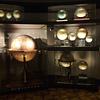You need to sign in or sign up before continuing.
Take a photo of a barcode or cover
My expectation of this book was that it would focus on Nafisi's relationship with her students. I was surprised by all the literary criticism. I found that to be the strongest part of the book. I felt that her character development was somewhat lacking. I used to think that authors mention the background of characters over and over again to fill up pages, but if you are introducing several characters and then go on with many pages of literary criticism, your readers may have a difficult time keeping the characters straight.
A book on my shelf that I've been meaning to read for years. It lived up to the hype. I found it both fascinating and depressing to read about the backwards trajectory of women's rights in Iran. Very Handmaid's Tale. You think it can't happen - why would people listen to religious extremists?!- but it can happen oh-so-easily.
The bit about Khomeini busing in rural villagers to protest in front of the American Embassy sadly reminded me of people here in America who blindly follow politicians and hate whatever country the politician deems to be worthy of hate. Little knowledge of the geo-political history of the country or of the current issues being faced. Instead, just a sort of gung-ho "us vs them" mentality. The ridiculous lies the rural villagers believed about America and how evil America was.....it's disheartening. How can humans ever work together to solve issues here on Earth? I guess it's human nature to divide into competing groups.
Besides all the Iranian history I learnt about, I learned a lot about various literary works Nafisi taught to her classes. I really need to re-read Daisy Miller. Her insights about Lolita and The Great Gatsby made me think about those books in a deeper way.
Some bits I liked:
It is only through literature that one can put oneself in someone else’s shoes and understand the other’s different and contradictory sides and refrain from becoming too ruthless. Outside the sphere of literature only one aspect of individuals is revealed. But if you understand their different dimensions you cannot easily murder them.
A good novel is one that shows the complexity of individuals, and creates enough space for all these characters to have a voice; in this way a novel is called democratic - not that it advocates democracy but that by nature it is so. Empathy lies at the heart of Gatsby, like so many other great novels - the biggest sin is to be blind to others' problems and pains. Not seeing them means denying their existence.
A novel is not an allegory, I said as the period was about to come to an end. It is the sensual experience of another world. If you don't enter that world, hold your breath with the characters and become involved in their destiny, you won't be able to empathize, and empathy is at the heart of the novel. This is how you read a novel: you inhale the experience. So start breathing.
If I turned towards books, it was because they were the only sanctuary I knew, one I needed in order to survive, to protect some aspect of myself that was now in constant retreat.
The bit about Khomeini busing in rural villagers to protest in front of the American Embassy sadly reminded me of people here in America who blindly follow politicians and hate whatever country the politician deems to be worthy of hate. Little knowledge of the geo-political history of the country or of the current issues being faced. Instead, just a sort of gung-ho "us vs them" mentality. The ridiculous lies the rural villagers believed about America and how evil America was.....it's disheartening. How can humans ever work together to solve issues here on Earth? I guess it's human nature to divide into competing groups.
Besides all the Iranian history I learnt about, I learned a lot about various literary works Nafisi taught to her classes. I really need to re-read Daisy Miller. Her insights about Lolita and The Great Gatsby made me think about those books in a deeper way.
Some bits I liked:
It is only through literature that one can put oneself in someone else’s shoes and understand the other’s different and contradictory sides and refrain from becoming too ruthless. Outside the sphere of literature only one aspect of individuals is revealed. But if you understand their different dimensions you cannot easily murder them.
A good novel is one that shows the complexity of individuals, and creates enough space for all these characters to have a voice; in this way a novel is called democratic - not that it advocates democracy but that by nature it is so. Empathy lies at the heart of Gatsby, like so many other great novels - the biggest sin is to be blind to others' problems and pains. Not seeing them means denying their existence.
A novel is not an allegory, I said as the period was about to come to an end. It is the sensual experience of another world. If you don't enter that world, hold your breath with the characters and become involved in their destiny, you won't be able to empathize, and empathy is at the heart of the novel. This is how you read a novel: you inhale the experience. So start breathing.
If I turned towards books, it was because they were the only sanctuary I knew, one I needed in order to survive, to protect some aspect of myself that was now in constant retreat.
Listened to the audiobook read by the author. Absolutely beautiful!
emotional
informative
reflective
slow-paced
This is my second time trying to get through this book, buy I've finally accepted that it's simply not for me. The idea is interesting, but I think the human element is what would make this, and that's exactly what's missing. The author gives these drawn out analyses of books and authors. She makes labored metaphors about the Iranian government and society. But there isn't any real human interest. Everything is very insubstantial and no character caught my attention. It's supposed to be a story about these women but the author barely mentions them. That's why it falls flat for me.
A view of a very different culture. Well told through references to personal history and English (largely) literature.
emotional
hopeful
reflective
medium-paced
4,5, en fait. Ces mémoires m'ont réellement touchée, même si ce n'est pas toujours facile à lire.
challenging
reflective
medium-paced
challenging
emotional
funny
informative
inspiring
reflective
sad
tense
medium-paced





